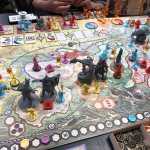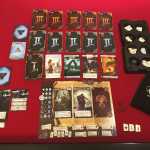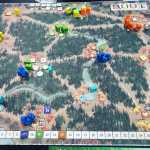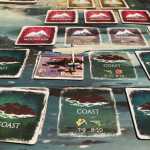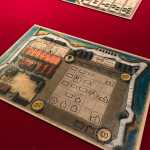Review: Nemo's War

So, you want to explore the depths and mystery of the oceans, do ye? You want to wage war across the world with a vastly superior craft that strikes fear into the hearts of men? You want to dive to find treasure beyond your wildest dreams?
But not get actually, you know, wet, or in real fights or anything like that, right?
Nemo's Sprawling War
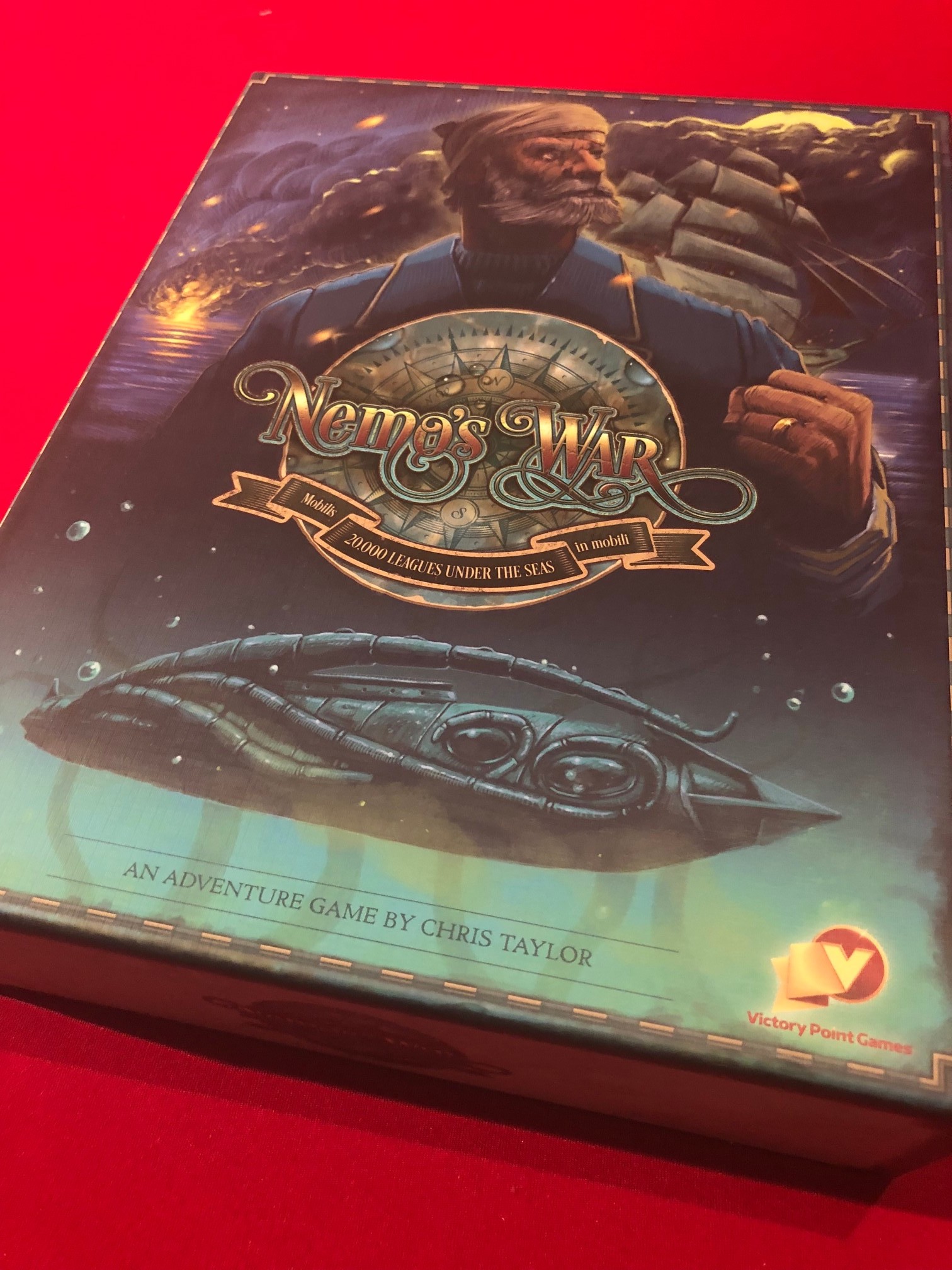
Nemo's War (Second Edition) is a game by Chris Taylor, modeled after the Jules Verne classic 20,000 Leagues Under the Sea. It's a mid-level depth solo game, with a co-op variant (more on that later), where you are Nemo himself, traversing the ocean to claim glory in one of four different victory conditions. The artwork by Ian O'Toole here is really quite stunning, with exquisite detail that really captures the feel and mood of the game.
Overall, Nemo's War is a push-your-luck action point management game. There's some light area-control-esque play, but you're mainly optimizing moves as you go, reacting to narrative events that take place as you progress. You'll also be placing unfriendly ships as you go, ranging from simple passenger ships to frightening naval battleships and ironclads. As the game goes on, you'll start to feel the slow, increasing press of the world arrayed against you as warships start to grind against your every move and action, keeping you on the edge between collapse and glory.
The game moves from a light exploration mode at the beginning to a tense survival fight near the end, scaling the difficulty right as you start to get your footing. What's really fun is just how much game there is here. It's somewhat overwhelming at first, unless you're a seasoned solo wargamer used to this kind of thing. Nemo's War strikes a nice balance in the middle of that spectrum.
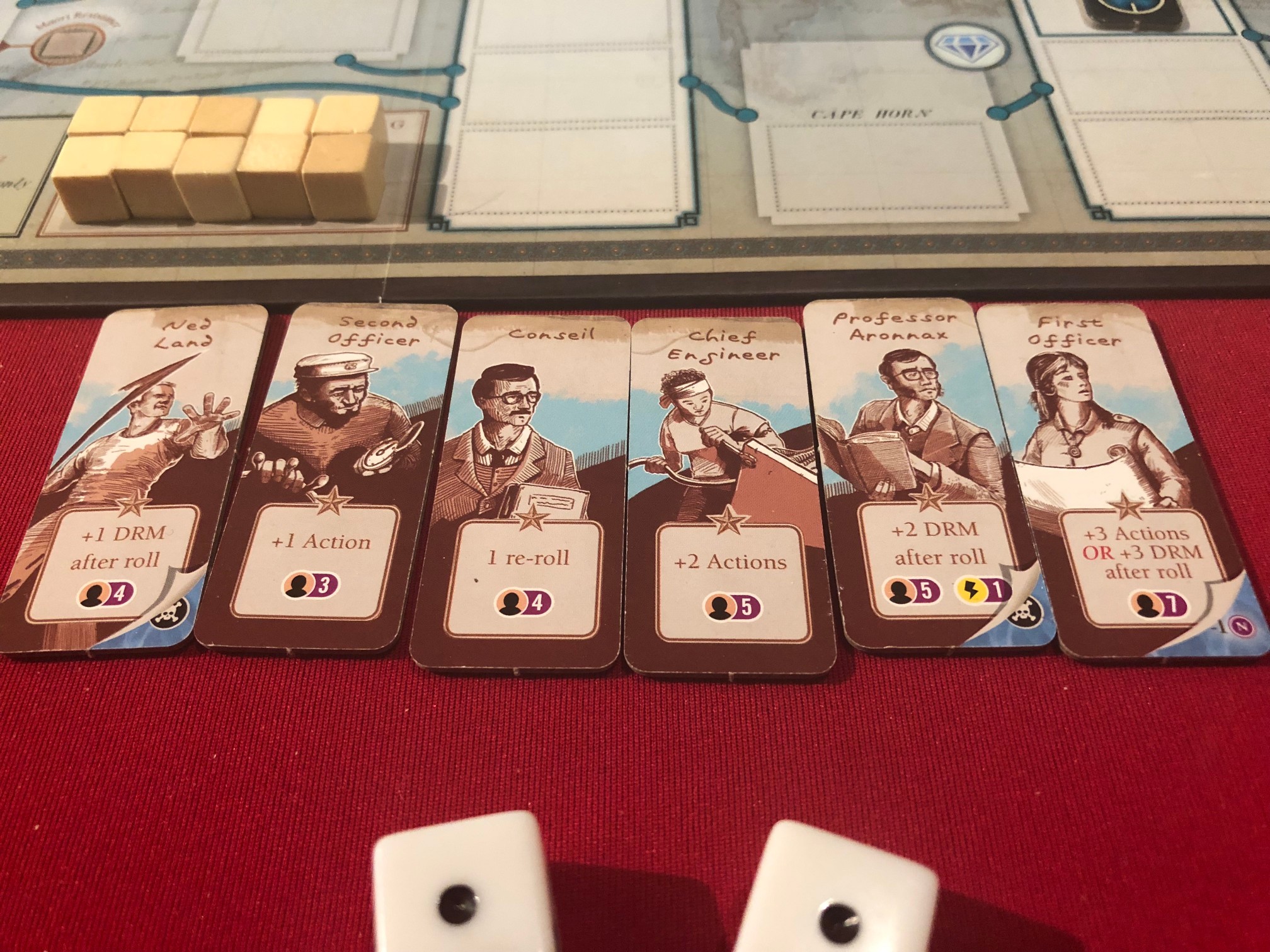
Some of which I may have kidnapped.
Art/Piece Quality
I don't normally do this, but it's worth calling out here - the art and pieces here are just fantastic. The art is a very detailed 19th century style, with the theming feeling on point. The event cards flavor text is great, nuanced, and if you've read Verne's book, you'll feel right at home.
The jewels that represent available treasures are just great, and pop when placed against the board, making it so you really want to go get one in the Nautilus right now. This is an easy game to get immersed in, especially if you play it with soft, gentle ocean sounds in the background, calming you to the waves....ahem. Yes.
The board itself is wonderfully designed, putting just the right amount of information in front of you when you need it; from turn-order to actions available to point management, it's all right there and easy to quickly navigate during the game. And unlike some games, the rules summaries on the board don't scream at you - they're subtly set onto the board without distracting.
My one gripe is the cardboard on some of the tokens wears easily, and could have been a higher grade. It's a really minor nit.

Gameplay
Turns are simple: draw and event card, roll to place ships and get action points, and then perform actions. You'll continually feel the crunch of not having enough actions, which good games should make you feel. In the start of the game you'll pick a "motive", which will determine the way you play the game. Go for a stealth Science run, choose Explore to try and maximize events, blow up a ton of ships in War!, or rouse the locals to revolt in Anti-Imperialism. Each plays completely differently and alters how you approach nearly every choice - taking on that battleship is a suicide pact with the Science motive, but in War! you'll charge in like Leroy Jenkins to nearly every fight. Each motive changes the multipliers and value of the different types of point systems in the game, causing you to care about certain elements more or less based on your motive. Added to this is you can actually switch motives later in the game, giving you an alternate path should your first attempt be going poorly. It's a neat mechanic.
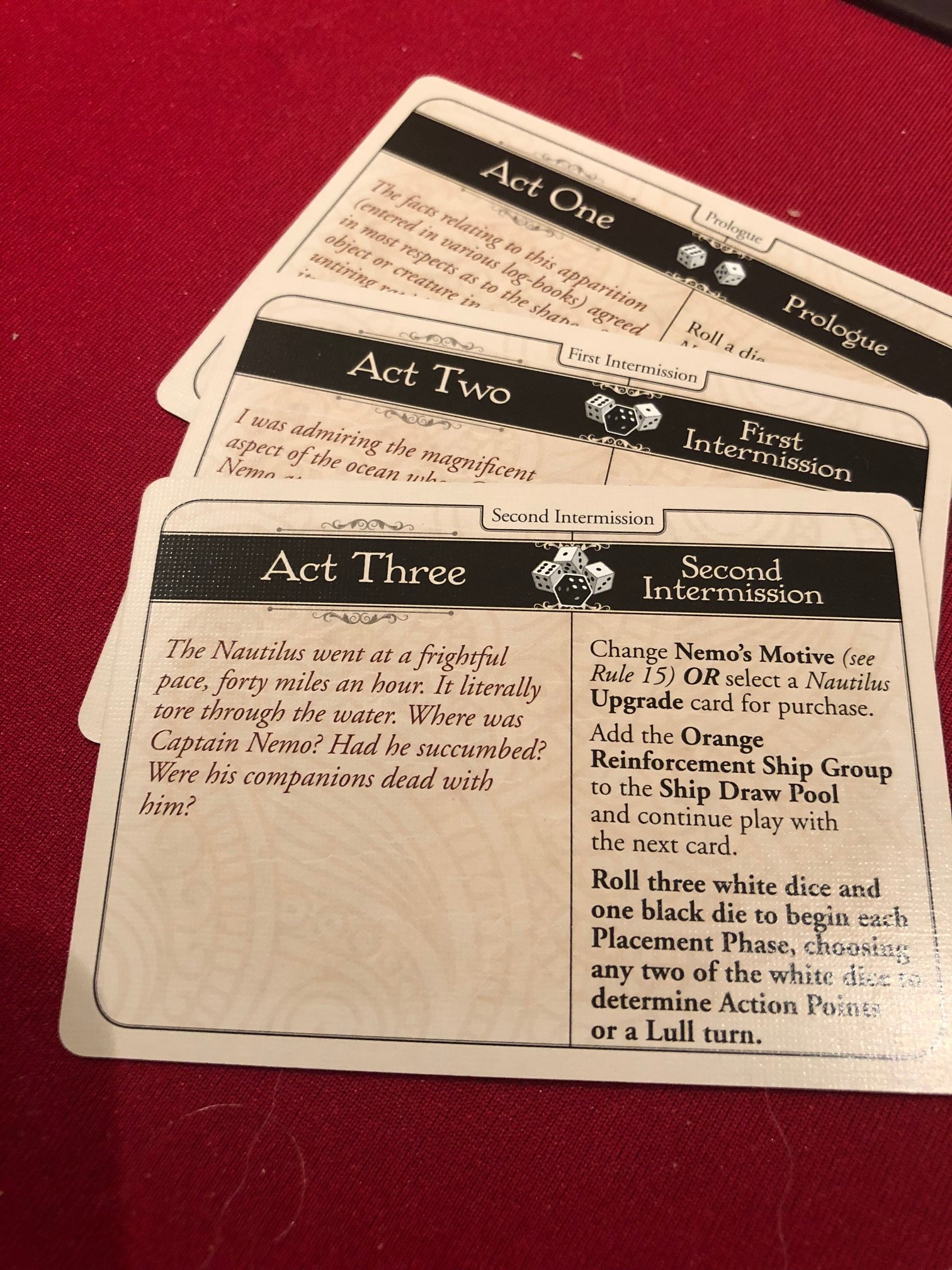
The setup is a long process, and while after a few plays you'll have it down to 10-15 minutes or so, prepare to spend some time doing this your first few plays. You'll prepare the event deck into "Acts", which will determine the scaling difficulty and intensifying pace of the game. Each act will add an extra die or condition to the game, upping the number of ships that show up to impede your victory. You'll also have to setup the ship pool - I highly recommend having some extra baggies on hand to sort these guys before packing up after playing.
At the beginning of the turn, you'll go on an adventure, or rather, draw an event card. The event deck is the gem of the game - set with stories from the novel, and quite large (62 cards), you'll do everything from fight warships, find treasure, and explore natural wonders. The nice part is you don't play the entire deck, so you'll have plenty of replayability here - including 7 separate finale cards that will determine how the game actually ends. These events keep the game feeling fresh as you play it, as their timing can either vault you into a great position, or completely throw a giant squid into your plans. Calamari, anyone?
Some will require you to make choices, go to locations (oceans, here), or even perform die roll tests. You will pass or fail these adventures, which will eventually add up to your final point total.
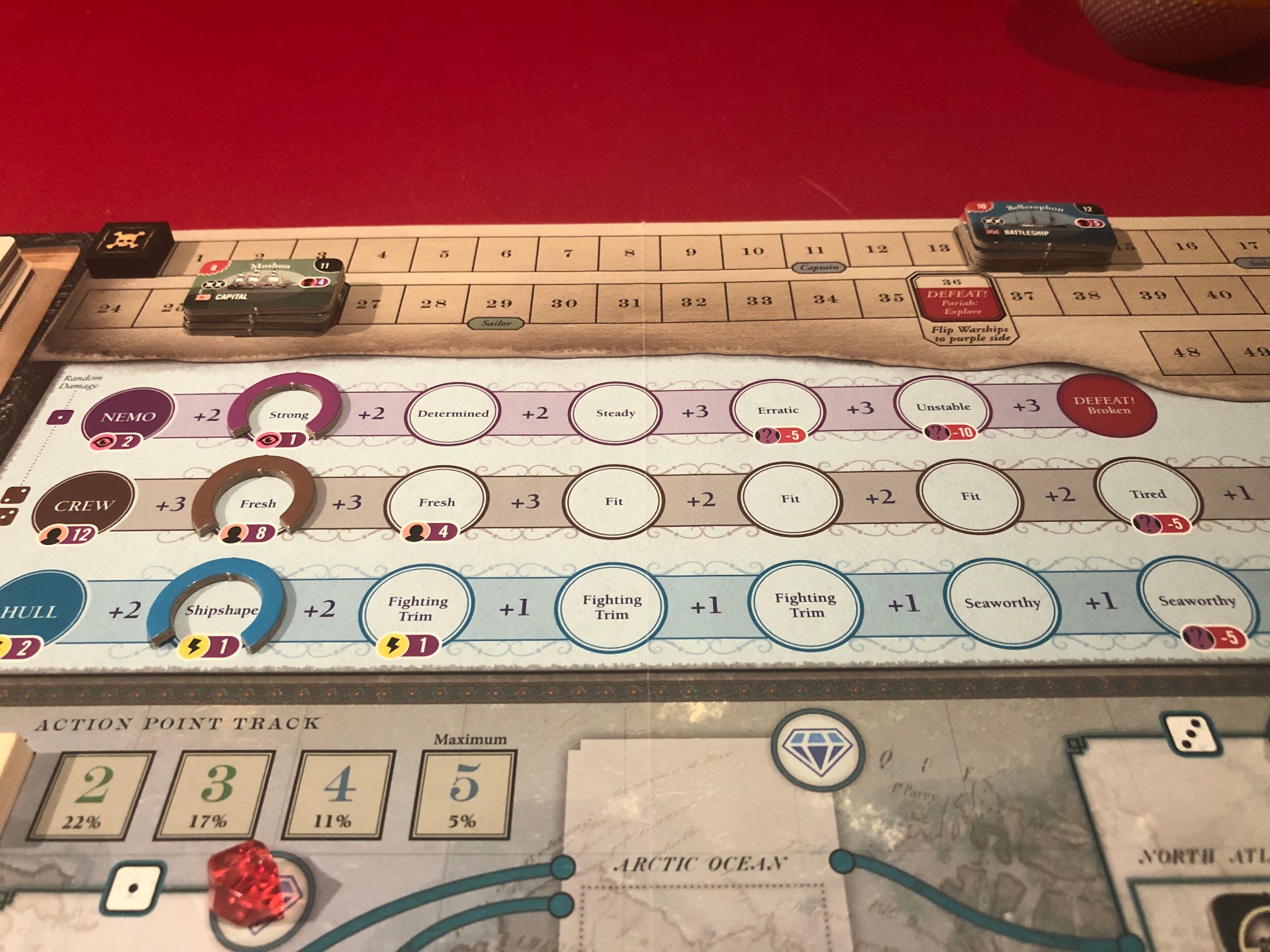
Roll, Die, Roll
And that brings us to the heart of the game - pressing your luck (or, rather, your crew, boat, and sanity). Most every test or fight in this game is done through die rolls, of which you'll be throwing a 2d6 across the table praying you get a high enough total to not take your ship down to the bottom of the sea. Because tests often have middle-to-high die totals, you can "wager" parts of the Nautilus (including yourself) - either Crew, Hull, or Nemo himself. They'll give you extra DRM (dice roll modifier) based on how healthy that component is. Pass the test, and you get your bet back. Fail, and you not only lose the test - and whatever bad thing it says to do - but also the thing you wager. The tension and gravity in risk taking here is palpable.
Keep those parts healthy and you'll score lots of points at the end of the game too, so there's motive to not bet the farm, so to speak. Lose too much and you will start bleeding points faster than a Kill Bill movie, or even worse, lose the game right-out. You can also sacrifice your officers as well, which are one-time boosts that get you nice saves, but cost you endgame points. No one likes a guy that sacrifices his first mate.
On a turn, you'll either fight ships in your space, search for treasure, rest to get more crew, repair your ship, refit it with upgrades (and oh man, are there some neat upgrades), or incite the locals to revolt. Most all of these require die roll tests, and you can wager in all of them. One thing is for sure, though - you won't have time to do them all, and you'll never feel like you can do enough of them, especially as the game goes on. You'll always feel just a bit behind. Which makes that snake eye die roll even more infuriating - and the lucky 12 so, so great.
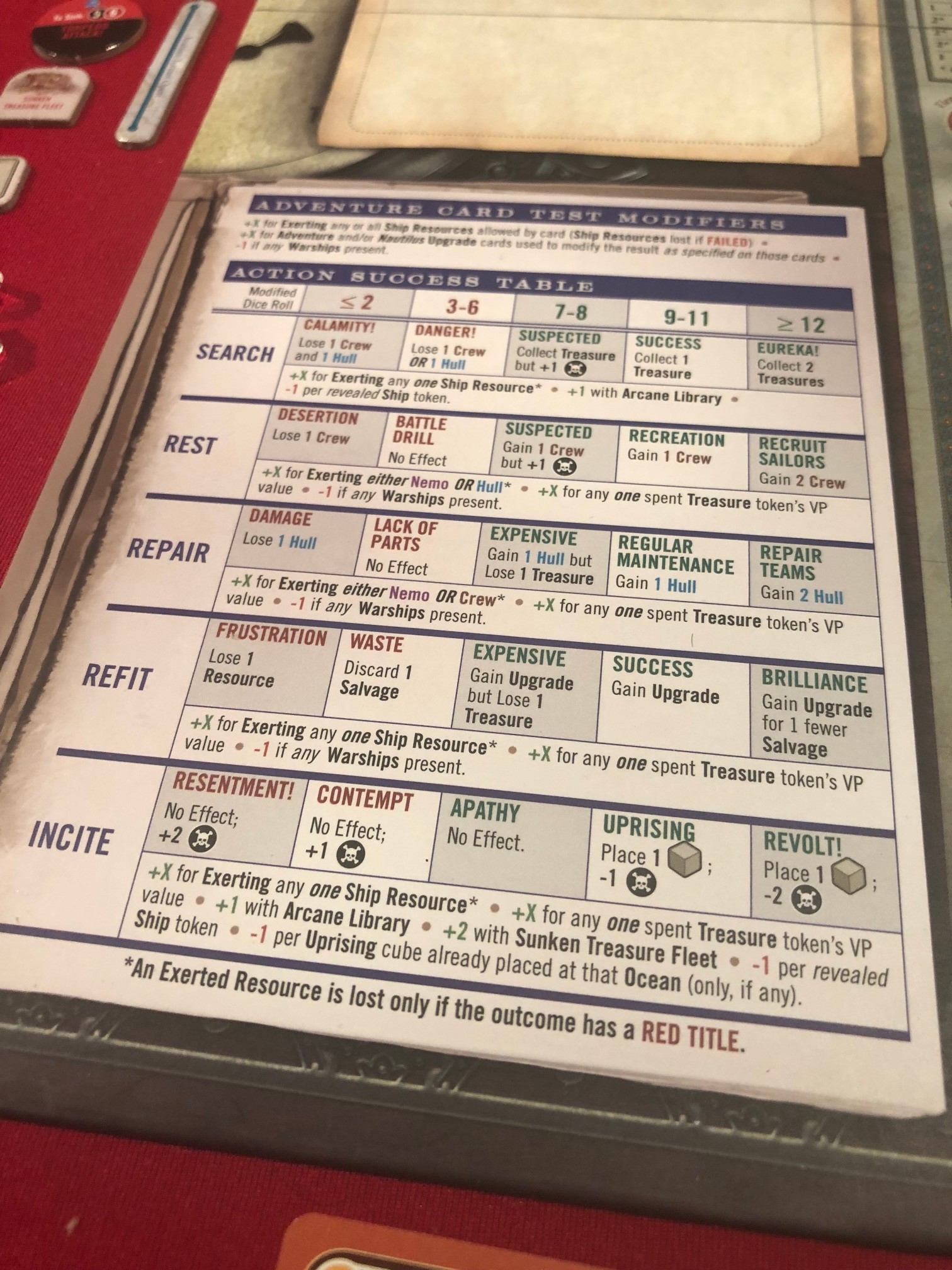
makes people leave you. Hmmmmm.
Combat
Combat is pretty straightforward - similar to tests, you roll 2d6 and try to get a higher number than the opposing ship's hull. You can either sneak in and get a +1 to the roll, or go bold and get the chance to fight multiple ships in a row for a single action. Fight warships though, and you'll have to avoid their shot first unless you sneak. Hits in this game hurt, as they lower the Nautlius' components, which are the same things you wager with, so weakening them too much will find you in a death spiral.

Destroying ships also gets you "notoriety", which acts as a gate on you trying to Rambo the board. Collect too much notoriety and you'll bring harder ships into the ship pool - do too much (especially in non-War! motives) and you'll just lose the game. As the game goes on, and you place more ships, you'll eventually run out of space and have to start flipping ships over to their mean side. These increase the difficulty and make those areas harder to do things like treasure hunt or start revolts. Irritate the world enough and you'll be overrun with enemies, losing the game.
Game End
Have you caught on yet that there's lots of ways to lose this game? There are. Lots. From dying from a cannonball, to going mad, to the entire world wanting you dead, you can lose Nemo's War a lot of ways. In higher game difficulties, this is a constant threat, and you'll have to spend time and resources managing all these levers.
Before you get nervous, let me note that this is one of the best parts of the game: the amount of depth and nuance all these failure conditions provide keeps each move feeling consequential and prevents boredom from seeping in what could be a drag. It also keeps one path of play from winning every time. Simply put, Nemo's War is a tactical game, not a strategic one. The best scorers will be nimble in their adjustments and not be afraid of abandoning prior plans.

The game ends when you've made it through the event deck, and you'll hit a Finale card. Depending on your point totals, you'll get a different "ending" in the Epilogue book. You'll be varying levels of triumphant and revelry, or humiliated and beaten. The Epilogue is a nice touch to an otherwise straightforward point system; and let's be honest - just surviving to the end in this game is hard enough, so more past that is gravy.
Co-operative Mode
So, I have to comment on the co-op mode. Yes, there is one. Yes, I've played it. Yes, it's controversial. Each person is assigned a role, which has certain governance and powers in the game (nothing beyond the solo mode, just more divvied up). You'll work as a team to survive. There's also a semi-cooperative mode in which each of you has separate point totals, and can mutiny the captain if you feel like he's being a jerk.
I would recommend skipping the semi-coop unless you like awkward tension and blame-shifting. Maybe you could pull it off. Maybe you'd throw one of the teammates off the ship and yell "You filthy landlubber!". Who knows.
The full coop mode, however, is interesting, but it's not going to behave like your normal coop. There's a high chance of quarterbacking here if one person is much more experienced. If you can get past that, there's plenty of value here - the shared narrative and risk of die rolls will have you both feeling the tension together, and the roles at least keep decision making shared. If you do coop with Nemo's War, I'd recommend having everyone know this isn't a "powers combined" mode as much as a "let's go on a journey" together shared storyline. You'll enjoy it a lot more that way.
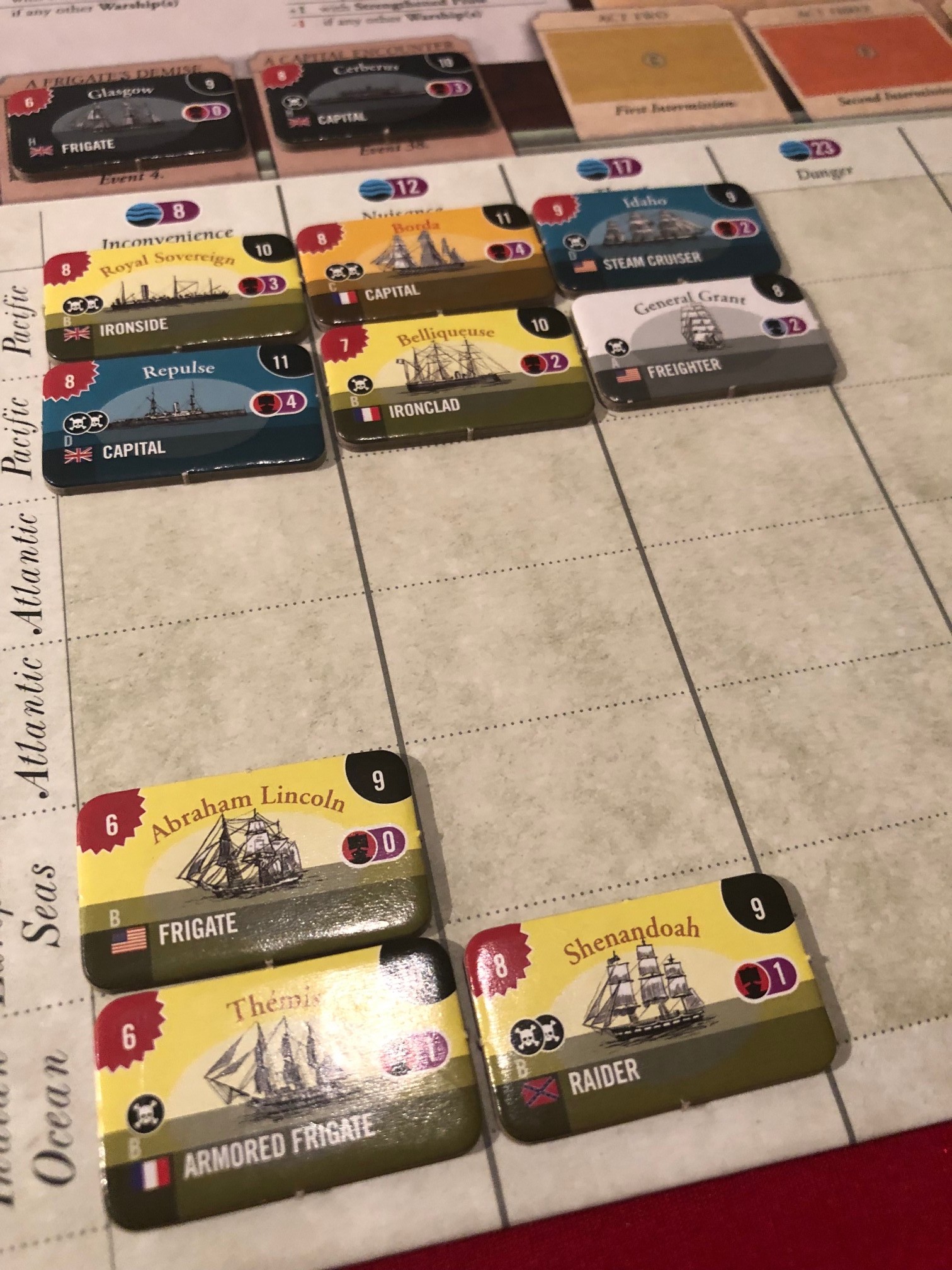
Thoughts
Nemo's War is one of my favorite solo games, simply because of the depth, excellent narrative and art, and challenge. It simply plays very differently than so many other solo games out there today. The tension and consequence of die rolls leave you slightly afraid of the die you hold, which is such a neat feeling. Every venture out into battle feels like it could be your last, and the exhilaration of getting to the hard-fought finale really is unique.
The different motives, upgrades, and difficulty levels - not to mention the Deadly Seas option and other variants the game already comes with you can bake in - make the game nearly infinitely replayable. Unlike some games where you might think motive would just change a small portion of the game, it drastically affects your experience and tempo; my Science plays are very, very different than when I go warmongering.
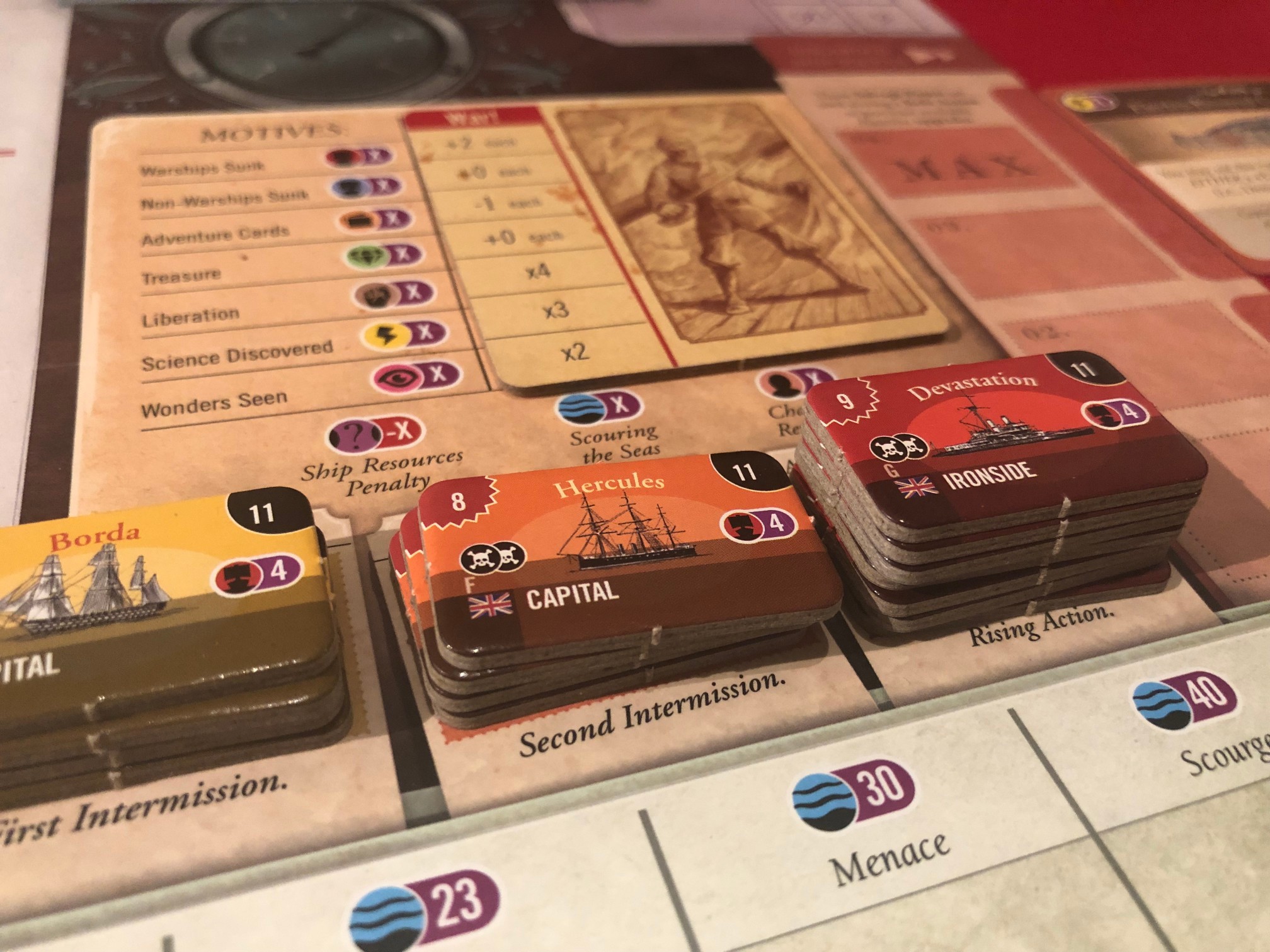
Add all this, and then the fact that the story is just interesting (there's a reason 20,000 Leagues is a classic novel) as it builds upon itself, really makes Nemo's War a winner. You'll really feel the inner pressure of Nemo as he took his reluctant crew across the seas, and the slowly incoming madness that took Nemo headlong into the Maelstrom.
Some might complain about the randomness of the die rolls and event decks, and how a bad upgrade draw can really affect your game. I'd point them again to my earlier comment - this game is a tactical game - you can't rely on a specific event chain or upgrade to win this game. You have to figure out its puzzle, which changes every time, to win. That enigmatic challenge, with its opaque path to victory, is what makes Nemo's War a winner in my book, and why it gets a hearty recommendation from us here at The Room and Board.
If you want a deep, engaging solo experience that will keep you guessing and challenged, go buy this game. You won't regret it.
Pros
Great depth
Excellent, thoughtful art
Tons of replayability through motives, events
Escalating tension and risk creates an immersive feel
Cons
Cardboard quality is limited
Setup can take a bit
fantastic
Board game reviews and news from Austin, Texas. We provide no-nonsense reviews about all kinds of games. With flair.

